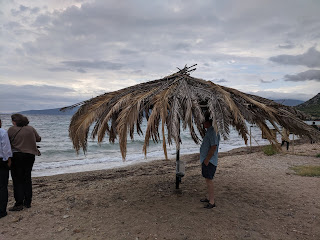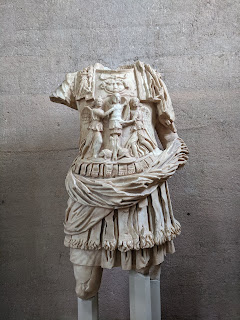In order to understand scripture, you must understand the world for which it was written. Original meaning was for intended audience. Archeological inquiry helps us understand the world for which it was produced.
Paul said all scripture is inspired. He did NOT say it was inerrant.
Mark 1:1 has political overtones: it shares the good news (which was previously only used for announcement of King); Calls Jesus the Son of God (drawn exclusively from lexicon of ancient world, not talking about Jesus ancestry); uses the word Christ (which was not a name but rather an attribution for a Royal figure).
Anachronism is the first and last enemy of the biblical story and historian. For instance, Davinci's last supper should not include chairs at all, or utensils from Davinci's time. In the time of Jesus and Paul, men did not wear long hair or beards. This came from Roman armies not wanting to give something to hang on to. There is extensive archeological evidence to support this, including portraiture, statuary, etc. 1 Cor 11:11 "..disgrace to wear long hair."
Nobody believes Jesus is Christ because he did or did not have a beard. This is interesting, historical speculation that helps us to understand context.
Jesus uses meals as occasions to build community. One wouldn't sit down with people, unless they were friends. There is a heirarchy of seating. This juggling for position is still going on in Paul's churches and he scolded them for allowing some to go hungry.
Greek was a universal language. Jesus, like most people even now, spoke multiple languages, included Aramaic and Greek.
Homework: What are the oldest words of Jesus recorded in scripture? "This is my body." Written around 60CE.
Acts18:18-Paul leaves Corinth. Corinth is ground zero for Apostle Paul.
Cenchrea Paul cut his hair off because he had taken a vow
Running the race references Isthmian games: races, pummeling his body, etc
Reference to clanging gong is to brass production, well known in Corinth.
Fear of flooding island Aegina kept them from building channel to convey goods. They erroneously believed sea levels were different. It had already been discovered that contiguous bodies of water are the same level.
No church buildings until fourth century. The ecclesia Paul talks about is gathering in people's houses.
Romans 16 includes a great deal of historical facts about Paul's time at Corinth. There were a lot of women in Paul's church per scripture: Men gave him trouble, women rescued him. People met in houses, there was a city administrator, Erastus, and the story of the first convert in Asia, Paul takes time to thank each one individually. Personal relationship in ministry is vital. Women are key leaders in church and his sponsors.
Tertius physically wrote the letter but Paul is author. Paul co-authored about half of "his" letters with others, eg. Timothy. Tertius (numbered name) means slave, meaning Paul had slaves and that Paul was pretty high up on the social ladder.
Steward and servant are designations for slave. Jesus restored slave to productivity when healing the Centurian's slave. We wish he would have set him free, ended slavery altogether. We also wish he would have ended war but it is not a reasonable expectation for Paul or Jesus to reflect our 20th century values.
God Asclepius of healing 600bc to 500ad, Jesus heavily influenced by this.
Homework: 2 Cor and Phil, two places where Paul self identifies.
Jesus would have encountered these Roman Emperial era items. Statues sometimes are headless because Christenson during middle ages were offended that they were idols
Temple of Apollo at museum site.
Pilgrimages are historically full of academic inquiry at archeological sites to prevent study from being too abstract. We explore for the sake of understanding.





































Comments
Post a Comment